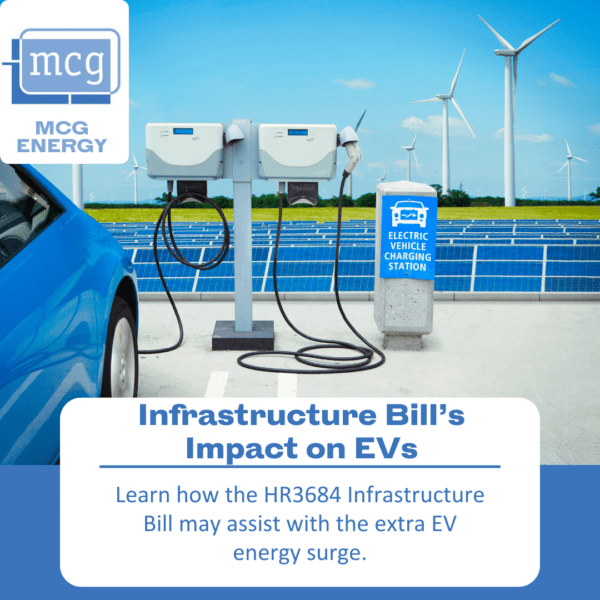
As electric vehicle adoption surges, our power grids face mounting pressure. MCG Energy recognizes the urgency for innovative solutions to meet the escalating demand for EV charging infrastructure amidst transformations like grid modernization. Committed to continuous innovation, our dedicated team is advancing our energy software to address the evolving demands of the energy industry, our customers, and the EV landscape.
As discussed in a previous post, the Infrastructure Investment and Jobs Act (H.R. 3684 or IIJA) significantly boosted the necessary infrastructure for energy projects including electric vehicle (EV) charging. Through this bill, $7.5 billion dollars has been allocated for the continued development of electric vehicle charging stations. In addition, the Inflation Reduction Act incentivizes automakers and consumers to strive for a cleaner future in transportation.
With EVs experiencing surges in growth, sales have increased from 4.4% to 9.9% of new passenger vehicle sales. This growth is reflected in over a million EVs sold in 2023. While the automotive industry is managing this booming market with increasing employment and new facilities, concern arises with the ability of the current infrastructure to meet the demands of the booming production of EVs.
EV Power Consumption and Building a Sustainable Infrastructure
To move towards decarbonization, greater utilization of renewable energy sources is necessary. Tapping into these renewables also is exposing the strain on our existing grids. As many of the renewable energy sources are primarily located in more rural areas, grids need to be outfitted with more high-voltage lines from these renewable sources to areas of high demand. All areas will need a significant amount of both high and low voltage lines to meet the growing demands of charging power.
The expenses associated with grid modernization are substantial for numerous regions and states. While the latest increase in energy consumption has not exhausted the current grid system, the data trends that include the demands of EV charging are pointing to grid modernization as a necessity.
EV Charging Programs
The increased demand on some already strained infrastructures has some utilities considering implementing EV charging programs. The implications of charging EVs during peak and off-peak times are leading many local utility services to turn to technology as a means to mitigate potential peak overloads. Off-peak loads usually occur overnight, thus encouraging many EV owners to utilize this time frame to recharge their EV. In other communities where solar energy creates a surplus of energy, daytime charging can be a cost-efficient means to tap into a renewable energy source.
Read more about the Infrastructure Investment and Jobs Act
Addressing EV Charging Infrastructure Trends
Government funding and tax credits provided by the Inflation Reduction Act play significant roles in driving innovation within the private sector for EV charging solutions. While the IIJA acts as a catalyst by providing crucial funding to incentivize private companies, it’s recognized that these measures alone are not sufficient.
Efforts extend beyond mere expansion of charging stations to encompass the implementation of smarter stations equipped with advanced grid management capabilities. Collaboration between public and private sectors, coupled with the adoption of innovative charging technologies and smart grid management strategies, is essential to achieving widespread EV adoption and substantial emissions’ reduction goals.
MCG Energy is active in that collaboration as we constantly monitor changes to ISO and RTO markets, and update our products and services as energy markets modify their operations to meet the increasing demand for EVs and renewable resources. MCG’s Software Assurance guarantee provides our customers coverage against any changes to core external industry systems that impact their MCG Energy solutions. Changes required to MCG applications to stay current with market changes are all included in MCG’s standard Support and Maintenance at no additional charge.
MCG Energy: Embracing the Future of Energy
Stay at the forefront of innovation with MCG Energy. Contact us today to learn how our energy software can help you navigate the future energy demands.

David Peterson, Ph.D. is the content specialist for MCG Energy Solutions.
